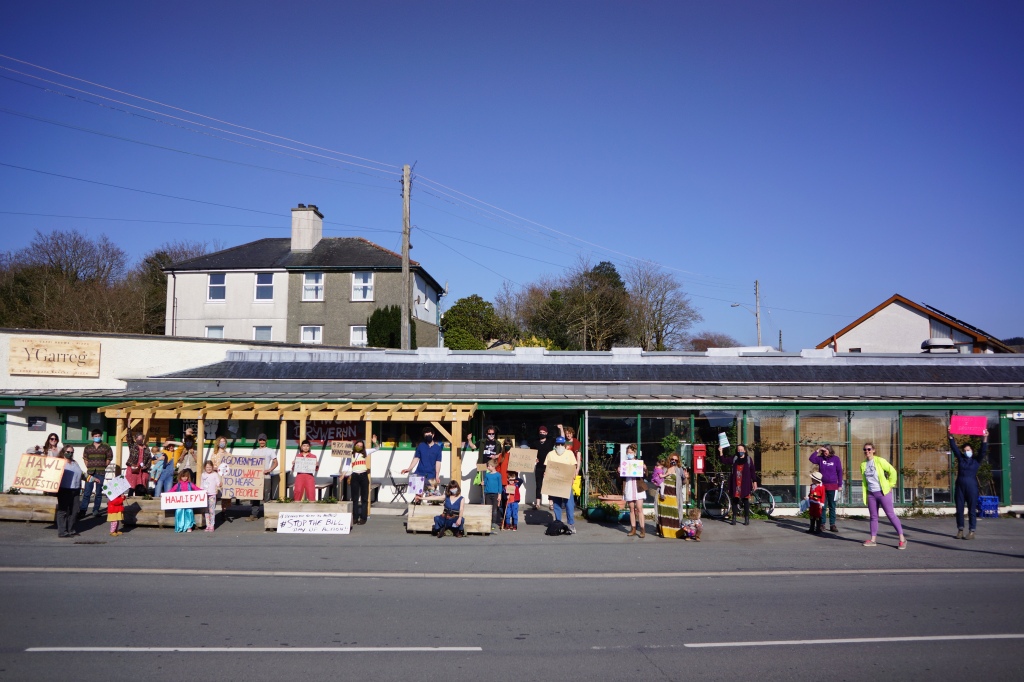A world turned upside down. A small village in northwest Wales; Llanfrothen. Speak the truth even if your voice shakes. The tory’s being tory’s have moved against protest. Vladimir would be proud, as would Donald, or Tony. In London, police warned, “enforcement action will be taken, if needed, in the interests of public health” and so it is that our inalienable right to protest tyranny is impinged and infringed. Whether you believe the draconian measures are necessary or not one thing is indisputable: our right to freely associate, to hug one another has been forcefully curtailed.
I write of course about the Police, Crime, Sentencing and Courts Bill – a clear attack on the right to protest unless it’s for BLM that’s OK but definitely not draconian house-arrest. That is definitely not A-OK. I must qualify that last sentence by the assertion that I fully support the right of BLM to assemble and protest as much as I fully support the right of anti-lockdown [sic] protesters to assemble and protest.
The Welsh know how to assemble and protest. In 1740, while the industrialisation of Wales was still gathering momentum, a group of miners gathered together in Rhuddlan to protest against low pay. The military was sent in to disperse the groups of miners and violence erupted. In 1758 a similar protest by the quarrymen of Cilgwyn saw a mass march on the town of Caernarfon in an attempt to seize corn that was being held there prior to shipment abroad. This time two of the protesters were killed.
In 1816 the riots in Merthyr and Treorchy were so serious that troops were brought in to disperse over 5,000 protesters. In 1984, the miners strike. A doomed attempt to curtail the actions of the National Coal Board, which had announced its intention of closing 20 mines. Nigh on 100% of the miners, the largest united strike in the country. Wales knows the importance of non-violent protest. The type of protest that the Conservative government of Boris Johnson et al are gunning for. The Police, Crime, Sentencing and Courts Bill seeks to give the police powers to break up and arrest protesters who cause a public nuisance. Protesting is a public nuisance. I have seen first hand the cruelty of police tactics; The Poll Tax demonstration in 1990. In 1994 another Kill the Bill: the Criminal Justice and Public Order Act, in 2018: the TUC Rally. A strong Welsh presence, a strong British presence. In 1990 the protests were catalytic for the abolition of the Poll Tax. A huge nuisance.

“How often have we heard the notion that somehow liberty is an integral part of the British character, and that we fortunate few in this country are somehow different from the rest of humanity? Not for us authoritarianism, autocracy or, God forbid, the dark slide into fascism. No, no, no—that is for other people and other countries, not us. Yet here we stand, yet again with yet another Bill from this Government stripping the people of this country of yet more liberty and more of their democratic rights.
English exceptionalism is a dangerous fallacy, none more so than when it comes to the constant vigilance required of any democracy. It is hubris of the first order—one I fear has infected those on the Government Benches. The potential for the slide into authoritarianism and worse is, as history has clearly demonstrated, part of the human condition. That is the painful and bloody lesson from the 20th century. Yet here we are, with this Bill before us. It is the tip of an authoritarian iceberg—one that is on a collision course with public defiance.” – Clive Lewis, in the House of Commons on Tuesday (16 March 2021)
Thanks for sharing some truths dear Ben xxx
LikeLiked by 1 person
Thanks Ben xxx
LikeLiked by 1 person